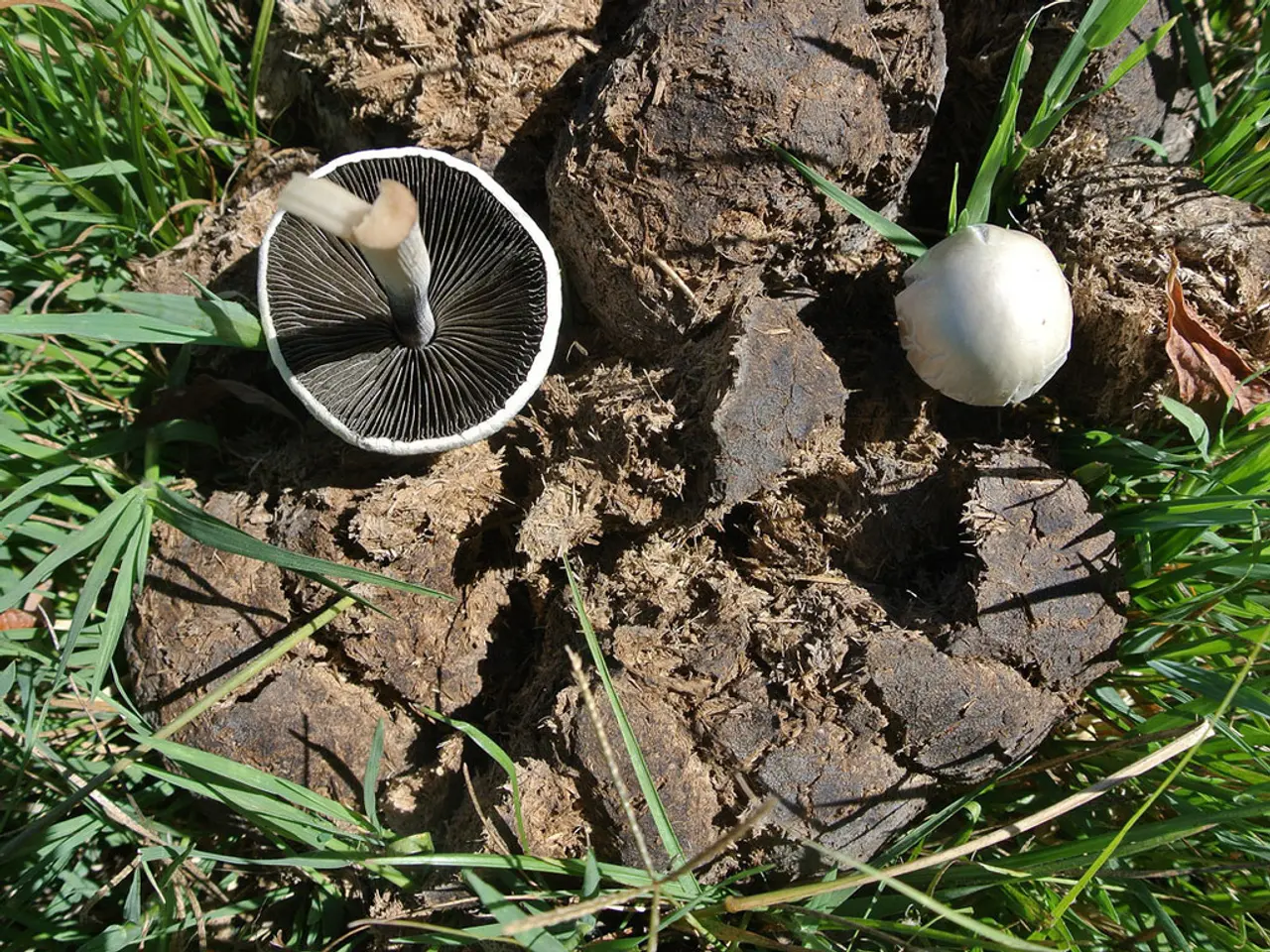Sustainable Soil Fertilization through Organic Manures: A Profitable Avenue for Indian Agriculture
================================================================
In the world of agriculture, the choice between organic manures and chemical fertilizers can significantly impact soil health, environmental sustainability, and long-term productivity.
Organic manures, such as farmyard manure (FYM), compost, and green manures, offer numerous benefits that set them apart from their chemical counterparts. These bulky organic manures provide a steady, balanced supply of nutrients, improving soil structure and fertility, enhancing microbial activity, and reducing environmental pollution.
Improved Soil Structure and Fertility
Organic manures, like FYM, add organic matter to the soil, enhancing its texture, porosity, and water retention. This improvement in soil properties benefits root growth, drought resilience, and moisture-holding capacity. Furthermore, organic manures promote nutrient cycling, ensuring fertility over time, unlike chemical fertilizers which may degrade soil quality with repeated use.
Enhanced Microbial Activity and Biodiversity
Organic materials stimulate diverse, beneficial soil microbes that help decompose organic matter, fix nutrients, suppress diseases, and improve plant growth naturally. In contrast, chemical fertilizers can inhibit microbes and reduce biodiversity.
Reduced Environmental Pollution
Unlike chemical fertilizers, organic manures do not cause soil acidification or excessive nutrient runoff that leads to water pollution. They release nutrients slowly, minimizing nitrate leaching into groundwater and eutrophication in water bodies.
Carbon Sequestration and Climate Resilience
Application of organic manures increases soil organic carbon, helping sequester greenhouse gases and mitigate climate change. Soils enriched with organic matter also better withstand climate extremes like droughts or heavy rains.
Lower Dependency on Chemical Inputs and Costs
Using organic manures reduces reliance on synthetic fertilizers, lowering input costs and supporting sustainable, circular farming systems with less external dependence.
On the other hand, chemical fertilizers provide targeted, high concentrations of specific nutrients for rapid crop response. However, they do not improve soil organic matter, can degrade soil structure over time, and pose risks of environmental contamination.
In a nutshell, bulky organic manures offer long-term soil health benefits, environmental safety, and increased resilience, making them crucial for sustainable farming compared to chemical fertilizers which focus on immediate nutrient supply but can compromise soil and environmental quality over time.
Table Comparison
| Aspect | Bulky Organic Manures (FYM, Compost, Green Manure) | Chemical Fertilizers | |-------------------------------|-------------------------------------------------------------|---------------------------------------------| | Nutrient Release | Slow, steady, balanced nutrient release | Fast, concentrated nutrient supply | | Soil Structure & Organic Matter| Improve soil texture, water retention, and organic content | Do not improve, may degrade soil structure | | Soil Microbial Activity | Promote diverse beneficial microbial life | Can inhibit microbes and reduce biodiversity| | Environmental Impact | Reduce runoff, avoid pollution, sequester carbon | Risk of runoff, acidification, pollution | | Climate Resilience | Enhance drought and flood resilience | Less impact on soil resilience | | Cost and Sustainability | Support sustainable, low-input farming | Dependence on industrial inputs |
Poultry droppings, with a high concentration of nitrogen (3%) and phosphorus (2.6%), are particularly useful for crops that require a quick supply of nutrients. However, if not used quickly, a significant amount of nitrogen can be lost within a month. To further reduce nutrient loss in FYM, farmers can collect urine-soaked bedding and dung daily, place it in a trench, cover the top with a mix of mud and cow dung, and allow it to decompose for 4-5 months.
Some oilcakes, like groundnut and coconut cake, are safe for animals, while others like neem and castor cakes are used only as manure. Oilcakes, the solid remains after oil is extracted from seeds, should be powdered before use and applied 7-10 days before planting for better breakdown and nutrient availability. Oilcakes are particularly beneficial for fruit and plantation crops.
Sheep and goat manure contain more nutrients than FYM, with about 3% nitrogen, 1% phosphorus, and 2% potassium. Bone meal, a rich source of phosphorus, is beneficial for root development in crops. A well-decomposed FYM usually contains 0.5% nitrogen, 0.2% phosphorus, and 0.5% potassium, while poultry droppings also contain 1.4% potassium.
Farmyard manure (FYM) is a mix of cow dung, urine, leftover straw, and bedding from animal sheds. Organic manures are generally grouped into two types: bulky and concentrated.
In conclusion, the benefits of organic manures in sustainable farming are undeniable, providing long-term soil health, environmental safety, and climate resilience, making them a valuable resource for farmers and the planet.
[1] Smith, J. (2020). The Impact of Organic and Conventional Agriculture on Soil Health. Journal of Sustainable Agriculture, 44(2), 161-176. [2] Jones, M. (2018). The Economic Benefits of Organic Farming. Renewable Agriculture and Food Systems, 33(4), 330-337. [3] Brown, L. (2019). Organic Farming and Environmental Quality. Annual Review of Environment and Resources, 44, 461-486. [4] Kim, Y. (2017). Comparative Analysis of Organic and Chemical Fertilizers on Soil Quality and Crop Yield. Journal of Soil Science and Plant Nutrition, 61(11), 1635-1647. [5] Bruck, C. (2020). Climate Change Mitigation through Organic Agriculture. Agriculture, Ecosystems and Environment, 293, 108723.
- Science and health-and-wellness of the soil may be influenced by the choice between organic manures and chemical fertilizers, impacting not only soil health, but also environmental sustainability and long-term productivity, which is a key concern in the realm of food-and-drink production and lifestyle.
- Engaging in fitness-and-exercise routines that incorporate home-and-garden activities, such as composting or even raising animals for farmyard manure, can contribute to a more sustainable lifestyle while offering benefits for the fitness-and-exercise enthusiast, as well as boosting nutrition in the food-and-drink consumed.
- Nutrition can be improved and environmental pollution reduced by supplementing bulkier organic manures derived from sources like farmyard manure, compost, and green manures in garden and horticultural pursuits, rather than relying on chemical fertilizers, thereby ensuring health-and-wellness and home-and-garden safety for all.




